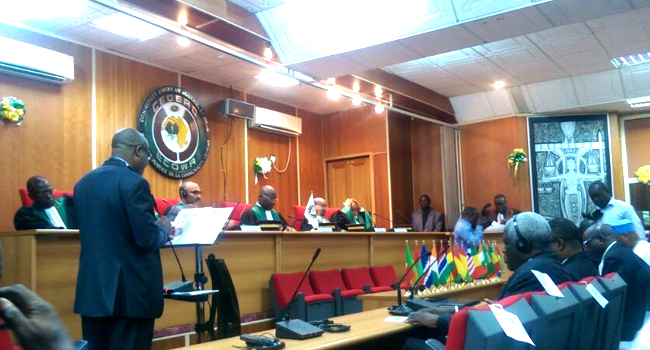The ECOWAS Community Court of Justice has ruled that the Twitter ban in Nigeria is a violation of the Freedom of Expression and access to information of Nigerians.
The court also ruled that the violation is in contravention of Article 9 of the African Charter and Article 19 of the International Covenant on Civil and Political Rights.
The Federal Government of Nigeria declared an indefinite ban of the micro-blogging platform, Twitter on June 5, 2021, but the ban was lifted on January 13th, 2022.
Following the ban, on June 21, 2021, a suit was filed against the Nigerian Government by four journalists; Ms. Blessing Oladunjoye of BONews Service, Mr. David Hundeyin, Mr. Samuel Ogundipe, and Mr. Nwakamri Zakari Apollo; and five Non-Governmental Organizations, Media Rights Agenda (MRA), Paradigm Initiative (PIN), Premium Times Centre for Investigative Journalism (PTCIJ), the International Press Centre (IPC), and Tap Initiative for Citizens Development (TICD).
Related suits were also filed by Socio-Economic Rights and Accountability Project (SERAP), a Lagos-based NGO, and 176 Nigerians Mr. Patrick Elohor and Chief Malcolm Omirhobo, a Lagos-based human rights lawyer.
In September 2021, the lawyer to the Nigerian government, Mr. Abdullahi Abubakar, requested that all the suits against the Federal Government be consolidated, following which the ECOWAS court granted the request.
While delivering the consolidated suit filed against the federal government of Nigeria over the indefinite suspension of Twitter in Nigeria in 2021, the presiding judge, Justice Gberi-bé Ouattara, who is the Vice President of the court, ruled that by blocking access to Twitter, the Nigerian government violated the rights of the plaintiff.
The Court ordered Nigeria to put in place a legal framework protecting freedom of expression that is consistent with international human rights law standards. The Court also ordered Nigeria not to block the social media platform again.
The counsel to the plaintiff, Barr Mojirayo Ogunlana-Nkanga shared that the judgment is a welcome development and a valuable one for the protection of the Freedom of Expression and the civic space of not just Nigeria, but the entire continent.

